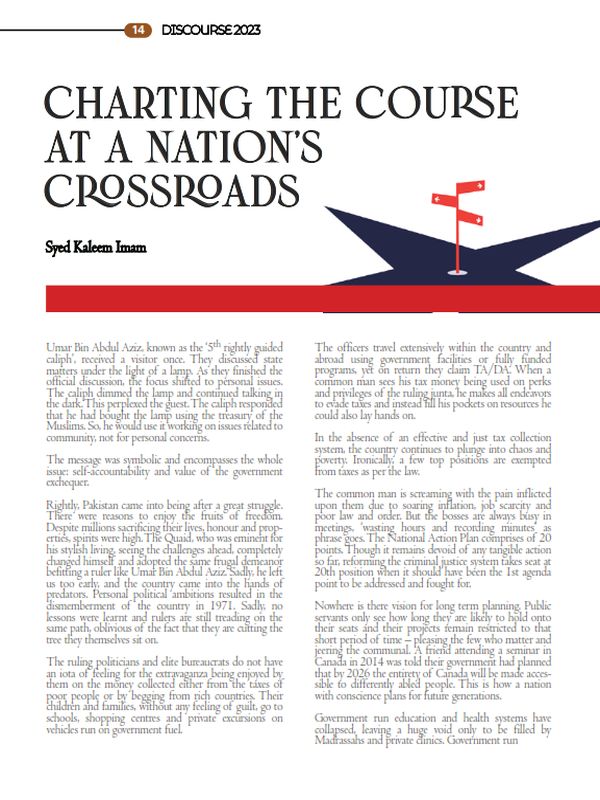Charting the Course at a Nation’s Crossroads
Umar Bin Abdul Aziz, known as the 5th, rightly caliph, received a visitor once. They discussed state matters under the light of a lamp. As they finished the official discussion, the focus shifted to personal issues. The caliph dimmed the lamp and continued talking in the dark. This perplexed the guest. The caliph responded that he had bought the lamp using the treasury of the Muslims. So, he would use it working on issues related to community, not for personal concerns.
The message was symbolic and encompasses the whole issue: self-accountability and value of the government exchequer.
Rightly, Pakistan came into being after a great struggle. There were reasons to enjoy the fruits of freedom. Despite millions sacrificing their lives, honour and properties, spirits were high. The Quaid, who was eminent for his stylish living, seeing the challenges ahead, completely changed himself and adopted the same frugal demeanor befitting a ruler like Umar Bin Abdul Aziz. Sadly, he left us too early, and the country came into the hands of predators. Personal political ambitions resulted in the dismemberment of the country in 1971. Sadly, no lessons were learnt and rulers are still treading on the same path, oblivious of the fact that they are cutting the tree they themselves sit on.
The ruling politicians and elite bureaucrats do not have an iota of feeling for the extravaganza being enjoyed by them on the money collected either from the taxes of poor people or by begging from rich countries. Their children and families, without any feeling of guilt, go to schools, shopping centres and private excursions on vehicles run on government fuel.
The officers travel extensively within the country and abroad using government facilities or fully funded programs, yet on return they claim TA/DA. When a common man sees his tax money being used on perks and privileges of the ruling junta, he makes all endeavors to evade taxes and instead fill his pockets on resources he could also lay hands on.
In the absence of an effective and just tax collection system, the country continues to plunge into chaos and poverty. Ironically, a few top positions are exempted from taxes as per the law.
The common man is screaming with the pain inflicted upon them due to soaring inflation, job scarcity and poor law and order. But the bosses are always busy in meetings, ‘wasting hours and recording minutes’ as phrase goes. The National Action Plan comprises of 20 points. Though it remains devoid of any tangible action so far, reforming the criminal justice system takes seat at 20th position when it should have been the 1st agenda point to be addressed and fought for.
Nowhere is there vision for long term planning. Public servants only see how long they are likely to hold onto their seats and their projects remain restricted to that short period of time – pleasing the few who matter and jeering the communal. A friend attending a seminar in Canada in 2014 was told their government had planned that by 2026 the entirety of Canada will be made accessible to differently abled people. This is how a nation with conscience plans for future generations.
Government run education and health systems have collapsed, leaving a huge void only to be filled by Madrassahs and private clinics. Government run departments have been filled with incompetent people due to political backing.
The solution to the problem is simple and will not take much effort. We need to reach the bottom of the problem: poverty, corruption, and a lack of accountability.
Some easy but far reaching consequential actions are:
- Optimum utilisation of human and physical resources. For instance: only one car for an official. No second vehicle in the name of escort or protocol.
- Everybody must pay for the vehicle(s) they are using through their own pockets. Let everybody feel the pain of high fuel prices.
- Utility bills must be paid by the occupants of government accommodation. If the house is too big, reduce the size.
- There should be no tax exemptions. The bigwigs enjoying this facility should come forward and withdraw the concessions themselves. Otherwise, the legislators should take a bold step and amend the law.
- The head of state’s visits abroad should comprise of no more than five individuals.
- Tax collection and its expense should be made public every month. For example, millions of vehicle taxes are collected in metropolitan cities every day. Where it goes and how it is spent remains a mystery. Had it been spent correctly, the condition of roads in cities and towns could be compared with any city across the world. Right now, 70% of the infrastructure can be compared to Mohenjo Daro.
- Addressing root causes of all ills lies in speedy justice. The delinquents and terrorists, once caught, go through the same old failed orthodox justice system. In our neighbours, like Iran, if a culprit is caught for terrorist activities or any heinous crime, within three days he is found hanging in a public place, infusing terror in other potential terrorists.
- The ministries and departments should only be headed by people from the relevant field, for example, the minister of education should be an educationist and a health minister should be a medical doctor.
We can still begin a meaningful journey toward good governance, prosperity and justice. Indeed, countries of the advanced world are thriving due their effective institutional arrangements and efficient, universal rule of law. No one dares misuse his power.
Let us set our house in order.
The author is a Consultant at the Centre for Governance Research (CGR).




